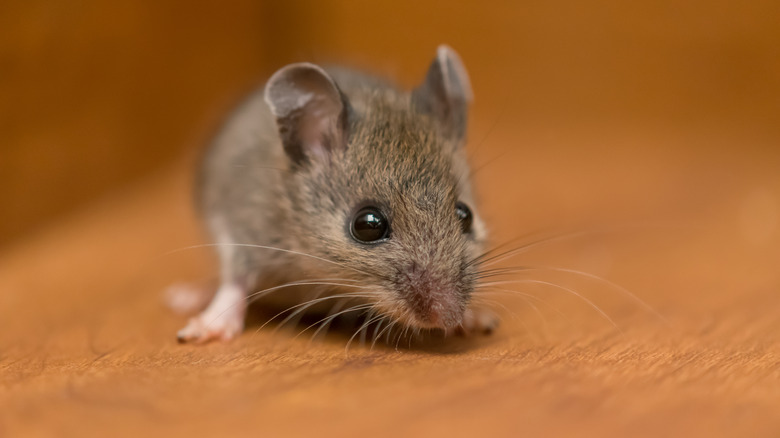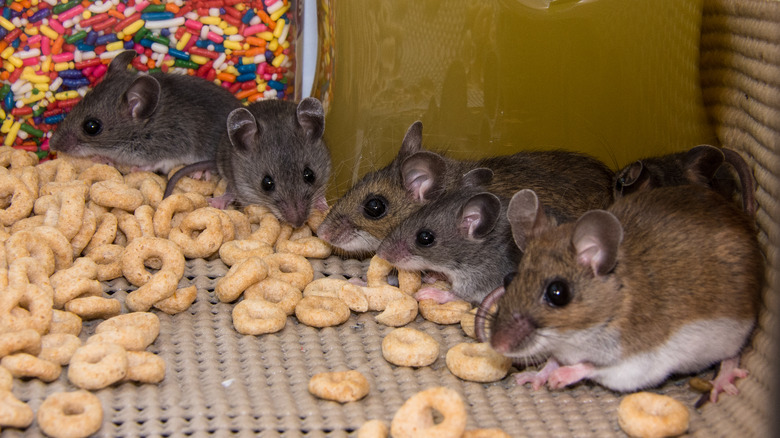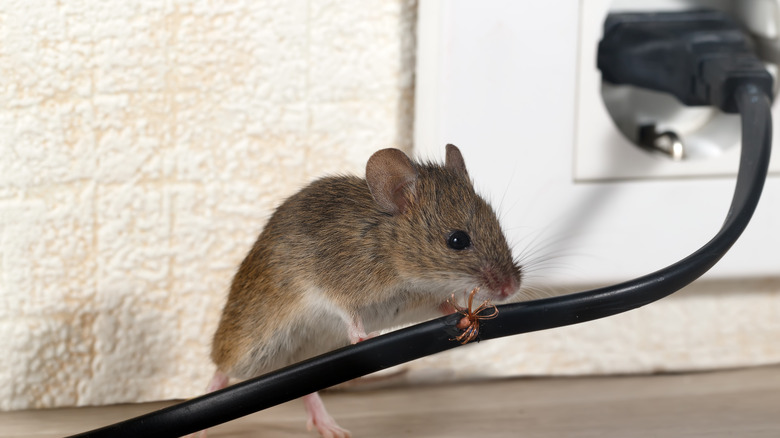If You See One Mouse, Is There A Hidden Infestation? Here's What Our Pest Control Expert Says
You've most likely heard the pitter-patter of tiny mouse feet in your attic or the occasional scratching noise. This may be more noticeable when they're in search of shelter, especially when it's wet or cold out. But at what point does a mouse in the house equal an infestation? Ian Williams, BCE, technical services manager at Orkin, spoke exclusively with House Digest about mice, infestations, and what homeowners can do in the event these pests infiltrate their homes. Mice are one of the pests you don't want to find in the walls of your home, so Williams discussed the signs of an infestation and why your pest infestation might be a bigger problem than you think.
Williams explained that one mouse doesn't point to an infestation. However, once a mouse realizes what a great place your home is, you might be stuck with them. "Once a mouse enters a structure and finds food and warmth, it rarely leaves," he said. "Mice multiply quickly, so vigilance and a quick response are key to keeping infestations at bay." According to Williams, the best way to handle an infestation is by contacting pest control professionals, such as Orkin or a similar service. They know the appropriate way to safely and humanely remove these critters, implementing Integrated Pest Management (IPM) as this reduces risk to people, animals, and the environment. These experts work to prevent unnecessary exposure to pesticides, something especially important if you have children and pets.
Signs of a mouse infestation
Mice can fit through an opening the width of a pencil, so it seems challenging to keep them out. This is why you need to understand the signs of a mouse infestation. In his exclusive interview with House Digest, Williams said, "Unfortunately, you might hear a mouse infestation before you see signs. Rodents like to gnaw on hard surfaces because their front teeth never stop growing, so the sound of that gnawing can echo in your walls. Homeowners might also notice droppings, which would be about half the size of a grain of rice, often with tapered ends."
Another sign of a mouse infestation is nesting material inside your home. This includes paper, scraps of fabric, and cardboard. You might even find that mice chew your insulation and drywall, ruining it. Since mice carry typhus, leptospirosis, salmonellosis, hantavirus, and plague, it's wise to consult professionals at the first sign of an infestation. Williams states that mice are among the dirtiest pests to infest a house due to the bacteria and diseases they transmit through their urine and feces. They also carry ticks, mites, and fleas. So, if you think you have an infestation after seeing a single mouse, it's best to have professionals check.
Mice can wreak havoc inside your home
In his exclusive interview with House Digest, Williams explains that mice don't just threaten your health. "Mice also pose a threat to your safety and property. They will chew on almost anything they find useful to build a nest, which could also potentially include burrowing into upholstered furniture or the seats of a car to create a secure place for nesting," he said. But mice are also known for posing a fire hazard to your home, so never leave an infestation unchecked. Chewing wires isn't the only way mice can be a fire threat. They also construct large nests in various electrical appliances, gnaw on insulation, and can cause dangerous circuit shortages.
Luckily, if you see one mouse and think you have an infestation, you can do something about it. Professional pest control companies have the knowledge and tools to tackle an infestation. Yes, there are ingredients you can use for home DIY pest control, but when used incorrectly, these measures put humans and animals at risk. No matter what your concerns are, trained pros can assuage your fears and help you combat a mouse problem. He says it's also crucial to disinfect a home after any type of infestation. This is a complex process, so it's best to defer to the pros. "Sanitization of areas with hantavirus contamination require personal protective equipment most homeowners don't own," said Williams. "Don't take the chance; call a professional for help."


